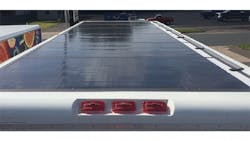“Rayfrigeration” TRU generates impressive results in real-world testing
eNow, producer of solar products for the transportation industry, demonstrated the effectiveness of its solar energy-producing systems for transportation by powering the first zero-emissions commercial-use transport refrigeration unit (TRU) on a truck making deliveries in an urban environment.
The new zero-emissions TRU, branded “Rayfrigeration,” has been undergoing real-world testing since April 2017 in California’s San Joaquin Valley. In five months of testing, emission reductions of 98% nitrous oxide, 86% carbon dioxide, and 97% particulate matter were achieved.
TRUs are refrigeration units mounted on trucks and are traditionally powered by high-polluting, small diesel engines to provide cooling to transport chilled products. The Rayfrigeration TRU, a battery-powered unit for commercial use, was tested on a Challenge Dairy Class 7 truck delivering fresh dairy products throughout Fresno CA.
Designed to support medium-temperature refrigeration applications, the Rayfrigeration system employs two forms of energy storage: eutectic medium (cold plates) and a high-capacity auxiliary battery system. The cold plates and auxiliary batteries are initially charged from utility power delivered to the vehicle when plugged in overnight. When the truck is operated on a delivery route, power is provided by eNow’s solar photovoltaic (PV) panels mounted on the truck’s roof.
eNow joined Johnson Refrigerated Truck Bodies, Emerson Climate Technologies, and Challenge Dairy Products Inc in the summer-long trial that took place in California’s San Joaquin Valley. The eNow team calculated that average emissions of CO2 over a four-day week with an average delivery day of 7.7 hours was reduced from 2,525 lbs/week to 159 lbs. Nitrous oxide emissions were reduced from 7162 grams to 1. This is after adjusting for emissions from the power plant supplying grid electricity that was used overnight. (Emissions from solar are 0.) In addition to eliminating harmful emissions, the Rayfrigeration unit is projected to reduce operations and maintenance costs by up to 90% over a diesel-powered TRU.
The Rayfrigeration solar-charging technology is available through eNow, which has more than 4,000 solar systems operating nationwide on Class 8 vehicles. Upon completion of the testing period, Challenge Dairy plans to transition its entire fleet of distribution trucks to solar-powered TRUs.
In an event held October 11—officially declared “Rayfrigeration Day” in Fresno—eNow joined Johnson, Emerson, Challenge Dairy, and government agencies to celebrate the ongoing successful demonstration of California’s first zero-emissions TRU.
The San Joaquin Valley Air Pollution Control District and EPA District 9 funded part of the Rayfrigeration initiative through the Technology Advancement Program that encourages innovation through development of new emission reduction technologies.
For more information, visit www.enowenergy.com.
